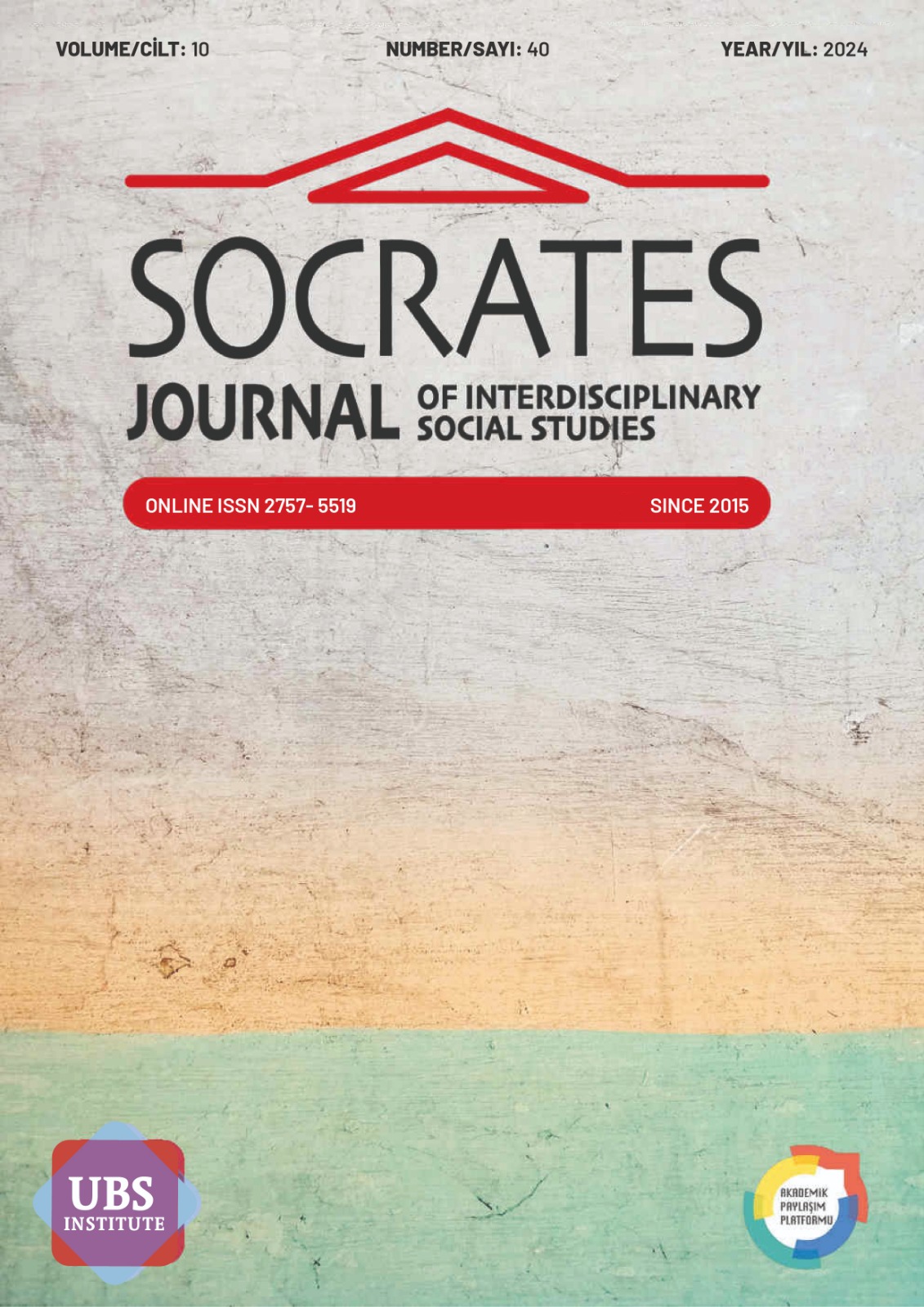VALUES EDUCATION IN SECONDARY SCHOOL EDUCATION PROGRAMS 2018
VALUES EDUCATION IN SECONDARY SCHOOL EDUCATION PROGRAMS 2018
DOI:
https://doi.org/10.5281/zenodo.11082278Keywords:
Value, Values Education, Secondary School, CurriculumAbstract
The aim of the research is to determine how values education is included in secondary school curriculum. Within the framework of this purpose, "How are values included in secondary school curriculum?" The question constitutes the main problem statement of the research. In the research, case study model, one of the qualitative research methods, was preferred. The data sources of the research consist of secondary school curriculums published on the official website of the Ministry of National Education in 2018, determined by the criterion sampling method, one of the purposeful sampling methods. In the research, data from secondary school curriculum obtained from online platforms were analyzed with descriptive and content analysis techniques in the context of the aims of the research. In the research, scientific and sharing in the context of values in secondary school Turkish course; Only aesthetics in Mathematics class, responsibility, scientificness, solidarity, patriotism, cooperation, thrift and aesthetics in Social Studies class, sensitivity, solidarity, responsibility and thrift values in Science class, love, respect, cooperation, solidarity and sharing in secondary school Religious Culture and Ethics class. and responsibility, T.R. It was determined that the values of independence and solidarity were included in the History of Revolution and Kemalism course, only aesthetics in the Visual Arts course, only patriotism in the Music course, sensitivity, respect and responsibility in the secondary school Physical Education and Sports course, and respect and sharing in the Information Technologies and Software course.
References
Akbaş, O. (2004). Türk milli eğitim sisteminin duyuşsal amaçlarının ilköğretim II. kademede gerçekleşme derecesinin değerlendirilmesi. Doktora tezi, Gazi Üniversitesi, Ankara.
Bacanlı, H. ve Dombaycı, M. A. (2012). Değer eğitiminde değer boyutlandırma yaklaşım. II. Uluslararası Değerler ve Eğitimi Sempozyumunda sunulan bildiri, 16-18 Kasım 2012, İstanbul.
Best, J. W., & Kahn, J. V. (2017). Eğitimde araştırma yöntemleri. (Çev. Ed. O. Köksal). Konya: Eğitim Yayınevi.
Bursa, S. ve Çengelci K. (2017). Türkiye ve Kanada Sosyal Bilgiler öğretim programlarının değerler eğitimi bakımından karşılaştırılması. Anadolu Journal of Educational Sciences International, 2(7), 338-372.
Gerekten, H. (2018). 5. sınıf Türkçe ders kitabındaki atasözlerinin değerler eğitimi açısından incelenmesi. Yüksek lisans tezi, Akdeniz Üniversitesi, Antalya.
Göçer, V. ve Kaya, F. (2023). Değerler eğitimi bağlamında ilkokul öğretim programlarının incelenmesi, E-Uluslararası Eğitim Araştırmaları Dergisi, 14(5), 274-295. DOI: https://doi.org/ 10.19160/e-ijer.1367295
Gürbüz, S. ve Şahin, F. (2018). Sosyal bilimlerde araştırma yöntemleri. Ankara: Seçkin Yayıncılık.
Hökelekli, H. ve Gündüz, T. (2004). Üstün yetenekli çocukların değer yönelimleri ve eğitimleri. R. Kaymakcan. vd. (Ed), Değerler ve Eğitimi Uluslararası Sempozyumu, 26-28 Kasım 2004.
Kadıoğlu, A. M. (2023). Examination of university students' levels of knowledge and awareness regarding the definition, scope and importance of cultural heritage. Socrates Journal of Interdisciplinary Social Studies, 9(30), 146-156.
Kaya, F. (2021). İlköğretim öğrencilerinin sosyal bilgiler ile insan hakları yurttaşlık ve demokrasi derslerindeki değerlere ilişkin tutumları. Doktora tezi, Erzincan Binali Yıldırım Üniversitesi, Erzincan.
Kaya, F. (2023). Karakter ve değer eğitim yaklaşımları ve uygulamaları. Karakter ve değerler eğitimi içinde (edit: Aysel Kızılkaya Namlı), Efeakademi Yayınları.
Kirschenbaum, H. (1995). Enhance values and morality in schools and youth settings, Allyn & Bacon Company, Massachusetts.
Koç, R. ve Akdoğan, H. (2018) Çocuklarda değer aktarımının önemi. The Journal of Academic Social Science Studies,1(65), 1-16.
Mayring, P. (2011). Nitel sosyal araştırmaya giriş. (Çev. Ed. A.Gümüş & M.S.Durgun). Ankara: BilgeSu Yayıncılık.
Özen, Y. (2012). Değerlerin kimlik ve kişilik kazanmadaki rolü. İnsan ve Toplum Bilimleri Araştırmaları Dergisi, 1(4), 167-181.
Özensel, B. (2004). Türk toplumunda çocuğun yetiştirilmesinde annenin rolü: Konya ili örneği. Değerler Eğitimi Dergisi, 2(6), 77-96.
Özeren, E., Göçer, V. ve Özeren, G. (2023). Ortaokul öğretim programlarında değerler eğitimin yeri. Socrates 8th International Education, Business, Economics And Social Sciences Congress, 28-30 September, Diyarbakır.
Sönmez, V. ve Alacapınar, F.G. (2011). Örneklendirilmiş bilimsel araştırma yöntemleri. Ankara: Anı Yayıncılık.
Tekşan, K. (2012). Türkçe dersi değerler eğitiminde Kutadgu Bilig'in kullanımı. Ahi Evran Üniversitesi Kırşehir Eğitim Fakültesi Dergisi (KEFAD), 13(3), 1-17.
Turan, R. ve Ulusoy, K. (2019). Farklı Yönleriyle Değerler Eğitimi. (3. Baskı). Ankara: Pegem Akademi.
Yıldırım, A. ve Şimşek, H. (2013). Sosyal bilimlerde nitel araştırma yöntemleri. Ankara: Seçkin Yayıncılık.
Yıldırım, Y. ve Akpınar, E. (2016). Cinsiyet faktörünün ortaokul 5. ve 6. sınıf öğrencilerinin sosyal olgunluk düzeyine etkisi. International Journal of Field Education, 2(1), 20-32.
Downloads
Published
How to Cite
Issue
Section
License
Copyright (c) 2024 Socrates Journal of Interdisciplinary Social Studies

This work is licensed under a Creative Commons Attribution 4.0 International License.


